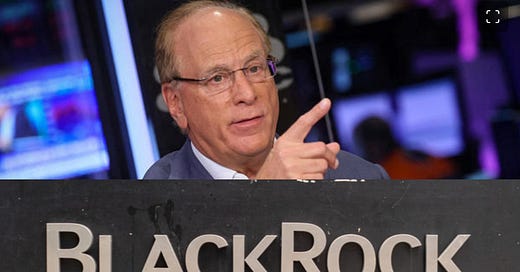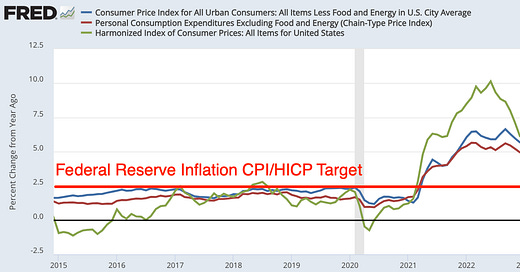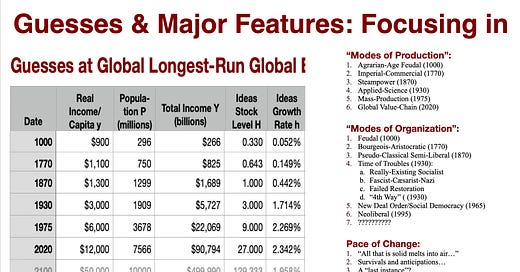
Discover more from Brad DeLong's Grasping Reality
Time to Ride or Die for Larry Fink!
The war against ESG, & for negative externalities and self-interest wrongly understood...
Almost all the time, I think Larry Fink and Blackrock are big enough, strong enough, and have enough economic and social power to take care of themselves.
After all, Blackrock has over $9 trillion in assets, more than the annual GDP flow of Japan and Germany combined. Blackrock has access to the highest levels of government, business and media. Blackrock has a reputation for being smart, savvy and influential.
But now I—strangely and surprisingly—think that that is not the case. Now I think that it is time to ride or die for Larry Fink.
Why? Because Larry Fink and Blackrock are big backers of Environmental, Social and Governance (ESG) investing. Every year since 2018, Fink has written a letter to CEOs of the companies in which BlackRock invests, urging them to embrace ESG principles and practices.
Alexis de Tocqueville, almost two centuries ago, would have understood the rationale behind and strongly approved of ESG investing. De Tocqueville viewed America as a democratic country in which individuals were primarily driven by self-interest to advance themselves. However, he said, that self-interest was "self-interest rightly understood": Americans understood that they could flourish only if their community flourished, and that they could flourish only if their customers and counterparties were satisfied by their deals and prospered as well. Americans were greedy but, as the saying goes, "long-term greedy". They were always eager to pitch in to help others succeed, and always focused on whether their enterprises were enriching the community.
That, in a nutshell, is ESG. ESG is not a fad. It is not a political agenda. It is not a threat to capitalism. It is a rational and responsible way of allocating capital that takes into account the long-term risks and opportunities of a changing world. It understands that those organizations that show that they are good citizens that advance the common good will be seen as and will be much better counterparties than organizations that do not care how much damage pollution does or how their actions affect how their workers and customers live or how corrupt they make the government.
Yet there are now, in every state with Republican-dominated legislatures plus some that are split, coordinated attacks trying to undermine the freedom of Blackrock and others to engage in ESG investing. Pleiades Strategy reports: Republican lawmakers in 37 states. 165 bills to restrict and penalize the use of ESG criteria by such as pension funds, insurers, contractors and regulators. Model legislation drafted by right-wing fossil-fuel interests who seek to accelerate and intensify global warming, and by right-wing groups who claim falsely that ESG is a threat to free markets and traditional values—rather than, as de Tocqueville pointed out in his Democracy in America the groundwork traditional value on which freedom and free markets were built.
The bills, variously:
Prohibit public pension funds, insurers, contractors and regulators from using ESG criteria.
Limit public entities' discretion as fiduciaries to consider anything other than shortest-term immediate financial returns, with no regard for externalities or reputation
Ban public entities from contracting with or investing in financial firms that are accused of boycotting or discriminating against fossil fuels, firearms, tobacco, private prisons, or other such industries.
Impose liability and penalties on public entities that violate anti-ESG provisions—license revocation, contract suspension, funds impoundments, or lawsuits.
Create substantial and burdensome reporting and auditing requirements to demonstrate compliance with anti-ESG provisions.
The sensible and patriotic oppose this wave: the business community, labor unions, environmental groups, and some (but disappointingly few) Republican politicians push back, pointing out that ESG investing is sensible risk management, an important part of investors' social responsibility, and—via its long-term effects on the world and on businesses' ability to find good counterparties, customers and suppliers—long-term returns.
Less than 20 bills passed. But there is a lot of right-wing fossil-fuel money behind them, a lot of ideology, and the grifters who see political capital to be gained from opposition to the "woke". Consider Florida's De Santis. Consider the Georgia Republican politicians promising that they will fight to keep electric-car manufacturer Rivian from having factories in the state.
ESG investing should not be a partisan issue. It is common-sense—long-term self interest, rightly understood. ESG investing has support from investors of all stripes: institutional investors such as pension funds, endowments and foundations; retail investors; and businesses and business leaders in all sectors, from technology giants such as Apple and Microsoft, to financial behemoths such as JPMorgan Chase and Goldman Sachs, and even BP and Shell
While Fink’s ESG letters have been praised, they have also been widely criticized by ESG foes on the right, and by some ESG supporters on the left. Accusations fly: hypocritical, opportunistic naive, or all three?. So I hear from both the greedy opportunistic right and the moral-purity left that I should dismiss his letters and, indeed, the whole ESG effort as mere rhetoric, greenwashing, or virtue signaling.
But such opposition to ESG is destructive.
It is time to ride or die with Larry Fink.


















Good column, but a faulty old trick: black rock does not have an income of $9 trn. it has assets that large. But GDP measures income, not assets. Bad comparison.
Fink and BlackRock continue to cater to the CEO class along with Vanguard, Fidelity and the other large asset houses. They continue to embrace stock option compensation and increasing CEO pay that is wildly out of wack from the average worker. I spend considerable time each proxy season going over the statements of the modest holdings in my portfolio. Most of the time I vote no on the advisory compensation question. ESG is tarred because of the Environmental and Social part of the triad when it is Governance that is the most important (at least to me).